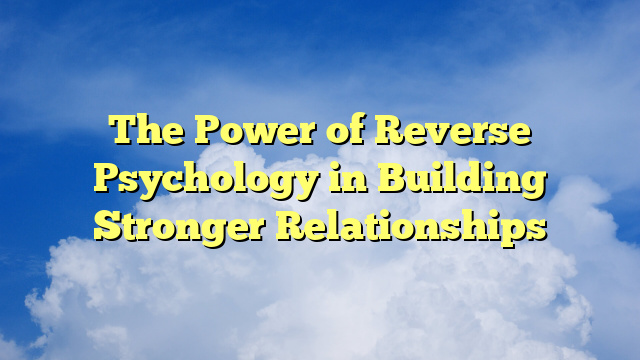The Power of Reverse Psychology in Building Stronger Relationships
The Power of Reverse Psychology in Building Stronger Relationships
Introduction
Building strong and healthy relationships is essential for personal growth and happiness. While there are various strategies and techniques to improve relationships, one often overlooked approach is the power of reverse psychology. Reverse psychology involves using indirect tactics to influence others’ behavior by encouraging them to do the opposite of what is desired. This article explores how reverse psychology can be a powerful tool in building stronger relationships.
Understanding Reverse Psychology
Reverse psychology is a psychological technique that involves getting someone to do what you want by suggesting the opposite. It works on the principle that people have a natural tendency to resist being told what to do. By using reverse psychology, you can tap into this resistance and influence others’ behavior in a subtle and effective way.
Applying Reverse Psychology in Relationships
Reverse psychology can be particularly useful in relationships, as it allows individuals to express their desires indirectly without coming across as demanding or controlling. Here are some ways to apply reverse psychology in building stronger relationships:
- Encouraging Independence: Instead of constantly seeking attention or reassurance from your partner, encourage them to pursue their own interests and hobbies. This not only gives them space but also makes them appreciate the time spent together more.
- Playing Hard to Get: While it may seem counterintuitive, playing hard to get can actually make you more desirable to your partner. By creating a sense of scarcity, you can increase their desire and commitment towards the relationship.
- Highlighting the Benefits of Change: Instead of directly asking your partner to change certain behaviors, focus on the positive outcomes that can result from those changes. By emphasizing the benefits, you can motivate them to make the desired changes themselves.
- Using Humor: Humor can be a powerful tool in diffusing tension and resolving conflicts. By using humor to address sensitive topics, you can make it easier for your partner to accept and consider your perspective.
- Offering Choices: Instead of giving ultimatums or making demands, present your partner with choices. This gives them a sense of control and autonomy, making them more likely to cooperate and make decisions that align with your desires.
The Benefits of Reverse Psychology
Reverse psychology offers several benefits when it comes to building stronger relationships:
- Improved Communication: By using indirect tactics, reverse psychology encourages open and honest communication without triggering defensiveness or resistance.
- Increased Empathy: Reverse psychology allows individuals to see things from their partner’s perspective, fostering empathy and understanding.
- Enhanced Trust: By giving your partner the freedom to make their own choices, reverse psychology builds trust and respect within the relationship.
- Reduced Conflict: Reverse psychology can help prevent unnecessary conflicts by addressing sensitive topics in a non-confrontational manner.
- Strengthened Emotional Connection: By using reverse psychology, individuals can create a deeper emotional connection with their partner, as they feel understood and supported.
Case Study: Reverse Psychology in Action
Let’s consider a hypothetical scenario to illustrate the power of reverse psychology in building stronger relationships:
John and Sarah have been dating for a few years, and John has been wanting to take their relationship to the next level by moving in together. However, Sarah has been hesitant and unsure about this step. Instead of pressuring Sarah or making her feel guilty, John decides to use reverse psychology.
He starts talking about how he understands Sarah’s concerns and how living together might not be the best idea. He mentions how it could potentially strain their relationship and how he values their current arrangement. By doing so, John indirectly communicates his desire to live together without making Sarah feel pressured.
Over time, Sarah starts to feel more comfortable with the idea of moving in together. She realizes that John respects her boundaries and is not trying to force her into anything. Eventually, Sarah brings up the topic herself, expressing her willingness to take the next step in their relationship.
Conclusion
Reverse psychology can be a powerful tool in building stronger relationships. By using indirect tactics, individuals can influence others’ behavior without triggering defensiveness or resistance. Whether it’s encouraging independence, highlighting the benefits of change, or using humor to diffuse tension, reverse psychology offers numerous benefits in fostering open communication, empathy, trust, and emotional connection. So, the next time you find yourself wanting to improve your relationships, consider harnessing the power of reverse psychology.

